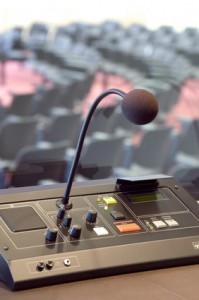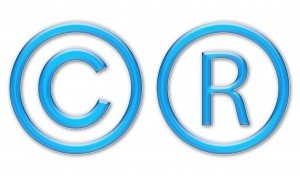When we work with potential clients and conference organizers we sometimes see similar patterns. Not all event managers use simultaneous or consecutive interpreters regularly and using language services for the first time may seem daunting. Avoid these common pitfalls:
1) Under-appreciating the value that interpreters bring:
 The budget of a conference can run into thousands and hundreds of thousands of dollars. What are fancy coffee breaks and brochures worth, though, if people are not able to communicate?
The budget of a conference can run into thousands and hundreds of thousands of dollars. What are fancy coffee breaks and brochures worth, though, if people are not able to communicate?
Hiring the best interpreters your budget can afford should really become your priority: everything else stems from there.
If you spend extra time selecting your conference interpretation provider and ask the right questions, it will save a lot of your nerves and time later on.
2) Hiring based exclusively on price (or “Gosh, it is so expensive!” or “Lowest bidder wins by default!”):
While any event manager must be smart about money, there are some areas where you can cut corners, however, and some where you should not.
Conference interpretation is a professional service and not dissimilar to what lawyers or doctors do: it takes years of training and constant practice to be a top notch simultaneous interpreter. Their number is limited and many are booked for months in advance.
No wonder that they charge. Of course, a high price is not a guarantee of quality either, so – as a conference organizer – you should naturally beware of too low and too high bids and use other criteria, due diligence, and consider not only the price tag.
See a link to our post on due diligence at the bottom of this page.
3) Thinking that a big translation agency is better:
 It is not necessarily the case. If you have a huge project lasting for several years, then a big agency may be able to support it better, but big translation agencies may also have huge overhead costs to support their staff and marketing.
It is not necessarily the case. If you have a huge project lasting for several years, then a big agency may be able to support it better, but big translation agencies may also have huge overhead costs to support their staff and marketing.
So in order to compete they may have no choice but to choose B or C list interpreters and not top grade equipment (e.g. a table top booth for simultaneous interpretation instead a “full” walk in booth).
Doing that may potentially deteriorate quality, because it will make interpreters unhappy and may reduce the pool of the best quality interpreters for your conference who would refuse to work in substandard conditions. As a result, you may have fewer choices.
Another solution is hiring a “consultant interpreter”.
Consultant interpreters may have their own agencies but it does not have to be the case. The difference here is that they are conference interpreters themselves and are intimately familiar with the intricacies of simultaneous interpretation.
This “insider view” is another safeguard to achieve better quality. Consultant interpreters perform the same tasks as an agency: select teams of interpreters, secure simultaneous interpretation equipment, etc.
The services they provide do not have to be only in the languages they themselves interpret from and into, because they have excellent networks of quality colleagues with various language combinations.
In the final analysis, what matters is the ability to offer A-list interpreters and equipment, at the same time not compromising on quality, and not doing anything that may damage your reputation.
4) Not realizing that conference interpreters work worldwide:
 Considering how globalized conference business is, it is no wonder that conference interpreters travel extensively.
Considering how globalized conference business is, it is no wonder that conference interpreters travel extensively.
In some cases (especially with rare languages or a very specialized topic) it is easier to fly in the interpreter who will provide better quality.
Hundreds of interpreters travel to G20 meetings or major international events. While there are excellent “local talents”, they cannot always be available in every location in all situations.
So budget extra funds for inviting some out-of-town interpreters.
If your conference interpretation provider tells you that local interpreters are not available, it may, actually, be a good sign, because they do not want to sell you the first interpreter they see in the local phone book.
5) Hiring simultaneous interpretation equipment and interpreters separately
 Simultaneous interpretation equipment (booths, consoles, headsets, receivers) is extremely specialized and the best solution is to hire it from a company that specializes in such equipment.
Simultaneous interpretation equipment (booths, consoles, headsets, receivers) is extremely specialized and the best solution is to hire it from a company that specializes in such equipment.
The number of such companies is limited and a regular AV company (though it may do a great job with audio and video) may not necessarily have sufficient expertise to provide such a service.
It is better if your interpretation services provider supplies both equipment and interpreters. Any decent translation agency, worthy of the name, will either have its own equipment, or will have a good working relationship with a quality supplier of simultaneous interpretation equipment.
6) Not paying attention to interpreters credentials and resumes
 While micro-management is not a good policy either, as a conference organizer you should be very well aware who your interpreters are, how experienced they are, if they belong to any professional interpreter associations with strict admission criteria and peer review.
While micro-management is not a good policy either, as a conference organizer you should be very well aware who your interpreters are, how experienced they are, if they belong to any professional interpreter associations with strict admission criteria and peer review.
You should not just assume that your interpretation services provider will always choose the best interpreters.
Remember also that there are different specializations and there are known instances when court interpreters hired for a conference simply turned off their microphones in half an hour because the speaker was “too difficult.”
Note also that previous experience with a particular topic is not an absolute requirement when hiring a conference interpreter: what matters more is a solid resume, membership is a prestigious professional association and Masters Degree in Conference Interpretation from an established interpreter school.
Years of experience also cannot be an indicator of a good interpreter, because it may be a poor interpreter who simply managed to survive on the market for a number of years.
7) Not supplying enough prep materials for interpreters
 Preparation is vital for interpreters! Sometimes an interpreter can spend several days preparing for a 1 hour event.
Preparation is vital for interpreters! Sometimes an interpreter can spend several days preparing for a 1 hour event.
Providing as much information as possible to your interpreters is in your best interests: the more they know the topic of your conference and the context the better.
You should certainly supply the agenda, speakers’ bios, documents that will be discussed, as well as PowerPoint presentations.
Provide either scripts of videos you want to play or show the videos to interpreters before the actual conference.
Consider a pre-conference briefing with interpreters.
8) Not providing a “full house feed” to interpreters
 In order to be able to perform simultaneous interpretation, interpreters need to be able to hear all sound sources in the room: microphones, soundtrack etc.
In order to be able to perform simultaneous interpretation, interpreters need to be able to hear all sound sources in the room: microphones, soundtrack etc.
It is called “full house feed” in the conference industry and it is naturally an absolute requirement for interpreters.
AV and production must be aware of this and you should also make sure you have a dedicated audio/video connection for speakers’ laptops if they want to use them during their presentations.
Sound quality is of paramount importance. Avoid poor quality audio connections such as consumer grade video conferencing software/microphones and bad quality VOIP.
9) Not budgeting for change of dates and/or cancellation
 93% of interpreters on the market are independent contractors. They book their time and resources well in advance and prepare diligently for your event.
93% of interpreters on the market are independent contractors. They book their time and resources well in advance and prepare diligently for your event.
In case if your conference is cancelled or the dates are changed they may not be able to find a replacement assignment at a short notice. A cancellation fee is therefore not a luxury or “free money” but a necessity.
Cancellation fees are usually charged after the contract is signed between the conference organizer/client and the conference interpretation services firm.
A diligent interpretation services provider shall verify with interpreters if they indeed could not find a replacement assignment for the dates in question and give you a written confirmation.
10) Not being aware of rules on recording and webcast of interpreters and copyright laws
 The interpretation conference interpreters produce is protected by intellectual property laws and interpreters cannot be recorded without their written consent that needs to be received in advance.
The interpretation conference interpreters produce is protected by intellectual property laws and interpreters cannot be recorded without their written consent that needs to be received in advance.
This intellectual property fee needs to be discussed if you want to record interpretation, otherwise, simultaneous interpretation at a conference is intended for “immediate consumption”.
Rates may vary per language or per interpreter and may reach 100% of the professional rate. Keep that in mind when you plan your conference budget!
Some jurisdictions have additional limitations, e.g. according to California law, interpreters cannot give up their intellectual property right.
We sincerely hope it was a useful introduction into best practices for hiring conference interpreters. Due diligence always helps! Now you can check out additional links below.
Additional Reading:
Due Diligence When Hiring a Conference Interpretation Provider
How to Hire the Best Language Interpretation Services: “Local Talents” vs. “Travelers”

